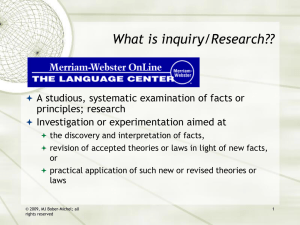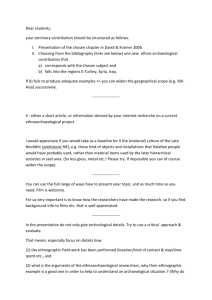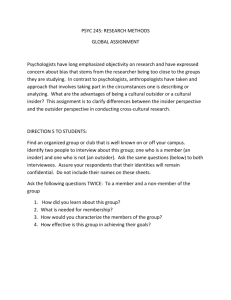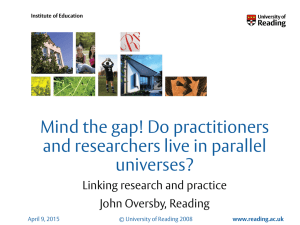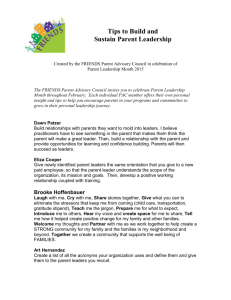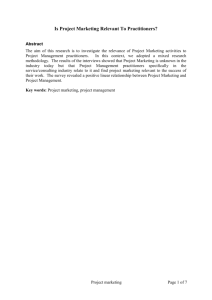the challenges of practitioner research
advertisement
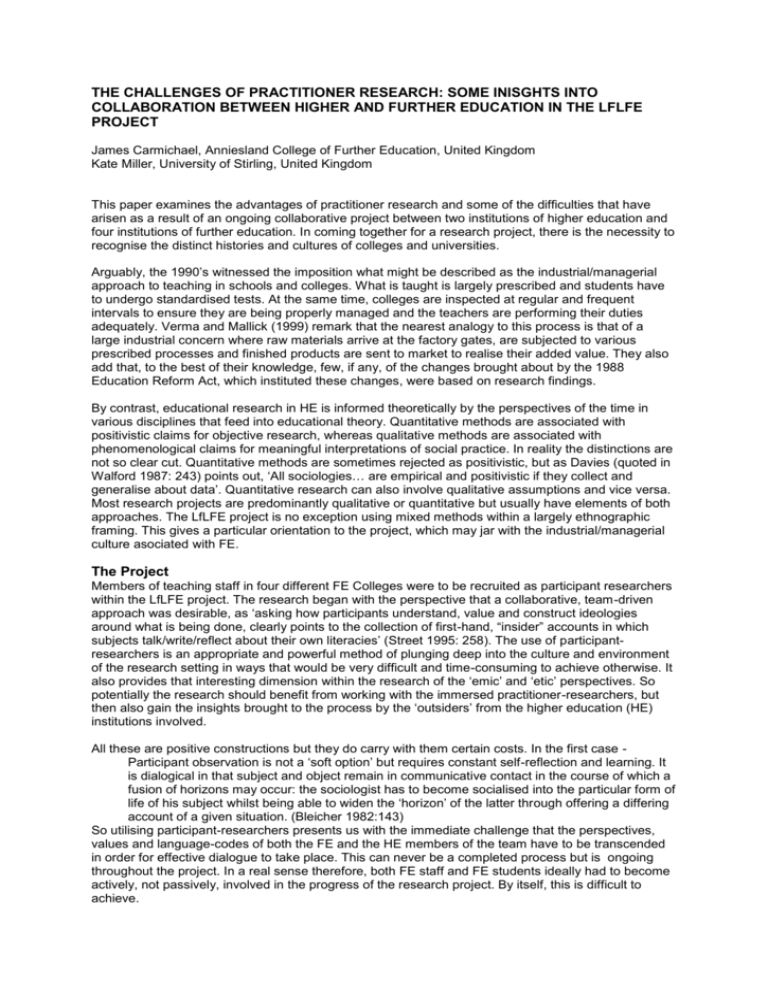
THE CHALLENGES OF PRACTITIONER RESEARCH: SOME INISGHTS INTO COLLABORATION BETWEEN HIGHER AND FURTHER EDUCATION IN THE LFLFE PROJECT James Carmichael, Anniesland College of Further Education, United Kingdom Kate Miller, University of Stirling, United Kingdom This paper examines the advantages of practitioner research and some of the difficulties that have arisen as a result of an ongoing collaborative project between two institutions of higher education and four institutions of further education. In coming together for a research project, there is the necessity to recognise the distinct histories and cultures of colleges and universities. Arguably, the 1990’s witnessed the imposition what might be described as the industrial/managerial approach to teaching in schools and colleges. What is taught is largely prescribed and students have to undergo standardised tests. At the same time, colleges are inspected at regular and frequent intervals to ensure they are being properly managed and the teachers are performing their duties adequately. Verma and Mallick (1999) remark that the nearest analogy to this process is that of a large industrial concern where raw materials arrive at the factory gates, are subjected to various prescribed processes and finished products are sent to market to realise their added value. They also add that, to the best of their knowledge, few, if any, of the changes brought about by the 1988 Education Reform Act, which instituted these changes, were based on research findings. By contrast, educational research in HE is informed theoretically by the perspectives of the time in various disciplines that feed into educational theory. Quantitative methods are associated with positivistic claims for objective research, whereas qualitative methods are associated with phenomenological claims for meaningful interpretations of social practice. In reality the distinctions are not so clear cut. Quantitative methods are sometimes rejected as positivistic, but as Davies (quoted in Walford 1987: 243) points out, ‘All sociologies… are empirical and positivistic if they collect and generalise about data’. Quantitative research can also involve qualitative assumptions and vice versa. Most research projects are predominantly qualitative or quantitative but usually have elements of both approaches. The LfLFE project is no exception using mixed methods within a largely ethnographic framing. This gives a particular orientation to the project, which may jar with the industrial/managerial culture asociated with FE. The Project Members of teaching staff in four different FE Colleges were to be recruited as participant researchers within the LfLFE project. The research began with the perspective that a collaborative, team-driven approach was desirable, as ‘asking how participants understand, value and construct ideologies around what is being done, clearly points to the collection of first-hand, “insider” accounts in which subjects talk/write/reflect about their own literacies’ (Street 1995: 258). The use of participantresearchers is an appropriate and powerful method of plunging deep into the culture and environment of the research setting in ways that would be very difficult and time-consuming to achieve otherwise. It also provides that interesting dimension within the research of the ‘emic’ and ‘etic’ perspectives. So potentially the research should benefit from working with the immersed practitioner-researchers, but then also gain the insights brought to the process by the ‘outsiders’ from the higher education (HE) institutions involved. All these are positive constructions but they do carry with them certain costs. In the first case Participant observation is not a ‘soft option’ but requires constant self-reflection and learning. It is dialogical in that subject and object remain in communicative contact in the course of which a fusion of horizons may occur: the sociologist has to become socialised into the particular form of life of his subject whilst being able to widen the ‘horizon’ of the latter through offering a differing account of a given situation. (Bleicher 1982:143) So utilising participant-researchers presents us with the immediate challenge that the perspectives, values and language-codes of both the FE and the HE members of the team have to be transcended in order for effective dialogue to take place. This can never be a completed process but is ongoing throughout the project. In a real sense therefore, both FE staff and FE students ideally had to become actively, not passively, involved in the progress of the research project. By itself, this is difficult to achieve. A tenant of the ethnographic approach adopted within the project is the assumption that the researcher from one cultural situation can understand and ‘read’ the cultural artefacts and discourses generated within the processes under study. However, sometimes it is valid to question that assumption. Whilst the gulf between HE and FE is not so complete that communication cannot occur, there are still issues in that process. They are, so to speak, two sets of educators separated by a common language! This can be addressed by drawing upon dialogical traditions. An important tenet of the pragmatic and dialectical traditions is that forms of thought are determined by forms of practice. For new forms of thought to develop, changes in practice are sometimes required. To develop new ideas one must have possibilities to test these ideas and to interact directly with those engaged in the practices under study (Chaiklin and Lave 1993). Reconstructive analysis seeks the insider’s view. However, there is a dialectical play between insider and outsider views. There is never a totally inside view, just as there is never a totally outside one. People constantly make outsider claims, third person claims, about events. This is the way people communicate. We are inside a culture, when we understand how our subjects themselves distinguish between outsider positions and insider positions. Understanding someone else necessitates a movement between an outsider and an insider position. Understanding occurs not through occupying one position or the other but rather in learning the cultural movement between them. Understanding is inter-subjective, not subjective nor objective. The hope is that by creating a dialogue between the practitioners and their students with their insider knowledge and the researchers with their outsider knowledge, new insights and new practices will develop. This requires of a research team attempts to ‘bridge the gap’ between the two institutional forms, a constant process of examination and reflection as the research proceeds in order to establish a common language and common procedures. Even so, there are and will be points of discontinuity. For example, to begin with, the process of setting up the research and launching it took much longer than was anticipated by the HE members of the team. Further many of the FE staff involved started with an expectation that HE staff would provide them with an established set of procedures and operations that they would be required to carry out, without themselves having to take responsibility or be involved in making decisions that would shape the research. One College-based researcher was presented with a document designed to give guidance for classroom observation, and the immediate reaction was; this was meant for someone who ‘made a job out of doing observations’. Teacher practitioners are concerned to get tangible and quantifiable results from research that means something in terms of their work. University-based researchers are aiming to do the same thing, but it might be that both parties have a different perspective as to what the work is. Educational research in FE is informed by the perspectives of the time. For example, in British government policy-making, statistical work has held a dominant position, which has had implications for the more quantitative approaches towards research which are dominant within FE. HE has for a long time done research on FE using practitioners as subjects or gatekeepers in order to get to their students, rather than asking the practitioners to be actively involved in the research process. Negotiation with practitioners has to take account of the priorities of the professional practitioner; the survival of the work itself depends on the continuation of this relationship, which might well involve considerable modification of original aims on the part of the researchers. On the other hand, the survival of the research team as academics or writers depends on a successful presentation of the research ‘product’, which may have to be sanitised and idealised if it is to be accepted. A key role has therefore been the work of those members of the research team who have provided the link between the HE and FE staff, negotiating the two disparate worlds, and juggling distinct sets of values and assumptions. Practitioner research is one way to provide the cultural immersion required by ethnographic research and the price tag that comes with that strength is one of time. The research process itself is inevitably slower and more complex as the team grows, discovers and invents ways to move the research forward whilst establishing a meaningful discourse within the team itself. A simpler and more direct research methodology would be quicker and easier to direct, but would also be lacking in the richness, in the ‘thick description’ that this method is aimed at developing. From the above, it becomes apparent that the priorities of practitioners and researchers of education are not always in line. So for a study such as ours, which is largely qualitative and ethnographic, there are important issues, since ‘analysis of meaningful social phenomena, ... proceeds hermeneutically in that they take as their starting point the dialogically established self-understanding of social actors and interpret it as a particular in relation to the general that is manifest in it’ (Bleicher 1982: 139). So we face the challenge of getting at an understanding of the ‘self-understanding of social actors’ and that, in turn, presents us with the substantial challenge of trying to build a working cross-institutional research team. Practitioner-researchers What of the response to the research project from staff in the FE sector itself? In the first case, the challenge was to find FE staff willing and able to become participant-researchers. The process of recruiting members of FE staff for the research team was not unproblematic. It might be thought that FE staff would welcome the notion of being involved in a very positive way with the business of developing a richer understanding of the practices and processes of learning in the FE sector. Whilst many were, matters are in fact not that simple. In effect, the sub-text of discussions with potential recruits was about the concern - ‘were they being required to take on additional work for which they would probably not be properly paid, and which would represent an additional work-load for which they would not be given adequate time to cope?’ Aside from this worry, some were intimidated by the view that it would involve them in ‘academic’ activities that they had left far behind in the days of their teacher-training. There were some indications from staff that their perceptions of the kinds of skills and literacy practices possessed by HE researchers was that they were appropriate and necessary for the purposes of carrying out research, but, by contrast, their own skills and literacy practices were inadequate to the task. At the same time this perception that HE staff were trained and able to do research in ways that FE practitioners were not, was also coupled or ‘knotted up’ with a view that HE practitioners would ask of the FE staff things that were unreasonable or in important ways ‘artificial’. That is to say, there was and is a perception among FE staff that the ways of the theoretical and academic world have nothing to do with the world of the actual and the practical. Getting past the initial difficulties of the caution and hesitation of some FE staff was not a simple matter. However, it is also the case that many FE staff were keen to participate but often found that their enthusiasm was not matched by other staff in their department or by their department head. Indeed it quickly emerged during the opening phases of organising the research that the ‘culture’ of the department was at least if not more important to the research, and for that matter to the day-to-day practice of the staff concerned, than the culture of the whole College as an institution. FE staff working as practitioner-researchers on the research project have to function within the normal operations of the department and sometimes priorities clash. In fact in a recent report published by the Scottish Further Education Unit, a support body for FE in Scotland, (Elliot 2005) one of the main barriers to participation in research was identified as being the fact that ‘there is no support for college researchers’. Many of the practitioner researcher thought it would be the role of HE staff to check their procedures and activities to make sure that they were ‘getting it right’. The notion that there might not simply be a right or wrong way to carry out the research was not only absent, but was positively resisted. The practitioner-researchers persisted in assuming that HE staff were not only going to provide the ‘right’ way to carry out research, but would also ‘judge their performance’ and would re-direct what they did in order to meet some undefined standard set at HE level. Institutional Cultures There is a macro level to the research which is about the general social environment, the workings of the sector, the ways in which policy imposes certain limitations, priorities and systems upon practitioners and students alike. At this level, the work of the project has had to encompass elements of the value-systems and priorities of the Colleges as institutions and of the system as a whole. These values and priorities reflect the priorities established by government and the wider societal valuesystems within which the institution operates, but it must also be about the value-systems that are generated within the institutions. These tend however, to be more about what happens at the meso level. This is the level at which the values and attitudes at work within the department impinge upon the operations and practices of the staff involved. And there is the micro-level involving an analysis of the literacy practices of students. Another of the dimensions of analysis is the relationship that has evolved between the HE institutions and the FE institutions. So, in a sense, we are required to look at horizontal layering in social relations that may have an impact upon the phenomena under study, but we also to some extent have to take account of the vertical divisions between the institutions involved. The priorities and interests of FE staff are somewhat different from those in HE. In FE, the priorities lie in facilitating the learning process and that process is tightly defined by learning outcomes, assessment schedules and HMI inspections. It is the day-to-day of meetings, marking and guidance. There is no space within this culture for discussions about research interests, when the priority is discussing the organisation of resources, the timing of assessments and the next curriculum meeting to talk about the revision of unit specifications. HE has similar pressures but, in many institutions, there is also an established space for research. As a result staff engaged upon research projects are stepping out of the institutional norms. Even in institutions that are supportive at a management level, the perceptions of colleagues is really more significant on a daily basis. For colleges and for departments, research can seem no more than something of a diversion, a ‘pet project’ and an indulgence that is tolerated as long as it does not interfere with the ‘real work’. It does not do to overstate this element of the experience of the project. It is not outright opposition to the research, but an attitude that can and does exist, in some instances, alongside a supportive rhetoric and is therefore a subtle pressure rather than an obvious hostility. Nonetheless, it is an attitude that arises out of the cultural norms and is therefore quietly powerful. At the meso level then, participant-researchers can face real difficulties, but they also have to face on a personal level the challenges and demands of the work itself, work that in many cases is quite alien to their experiences and which can ask of them very difficult questions. In the attempt to construct a working relationship between HE and FE therefore, the challenge of the different cultures is one that is, in some respects, quite obvious and direct, but it can also be quite subtle and difficult to identify. FE and HE staff live and move within institutional cultures that have much in common, but these very similarities can and do conceal significant differences which in fact are exposed and made concrete within a research project that thrusts the two sets of institutions into direct contact. At the same time, the challenge for each of the members of the team, FE and HE is to recognise the ways in which their own practice is informed and affected by the cultures they move within, and the implicit, unstated but still very powerful values and attitudes that organisational culture engenders. Becher (1989), in his study on the cultures of disciplines in higher education, attempts to identify the linkages between the social and the cognitive, between what he calls ‘academic tribes’ and the territories they inhabit. Disciplines are conceived as having recognisable identities and particular cultural attributes. An individual’s sense of belonging to his or her academic tribe is manifested in a variety of ways. It is, however, through the medium of language that some of the more fundamental distinctions emerge. The above relates just as much to different curriculum areas in FE as it does to disciplinary areas in HE. Becher argues that the professional language and literature of a disciplinary group play a key role in establishing its cultural identity. ‘The tribes of academe, one might argue, define their own identities and defend their own patches of intellectual ground by employing a variety devices geared to the exclusion of illegal immigrants’ (Becher 1989: 24). Alongside structural features are the more explicitly cultural elements: their traditions, customs and practices, transmitted knowledge, beliefs, morals and rules of conduct, as well as their linguistic and symbolic forms of communication and the meanings they share. Given the nature of the experience of the research project, even as the project pursues the examination of literacy practices among students, it inescapably involves us in examining our own practices and with it our values and attitudes and brings up to the surface sets of implicit judgements and assumptions. That in itself can be a painful process. As Gadamer (1981: 404) has put it The process of communication is not a mere action, a purposeful activity, a setting-up of signs through which I transmit my will to others..... It is a living process in which a community of life is lived out. ... human language must be thought of as a special and unique living process in that, in linguistic communication ‘world’ is disclosed. Conclusions Practitioner-research as a method of pursuing ethnographic research is challenging and difficult. In some respects the process is itself the point of the research. Being engaged in such work challenges the world-view of each member of the research team and particularly each practitioner-researcher. It challenges practitioner-researchers to re-examine the nature of their practice. It also focuses upon the assumptions, the implicit value-judgements that often affect and direct the ways in which practice operates. For all these reasons this kind of research is of great value to those who participate in it, at whatever level. Still it is valid to ask if the advantages outweigh the disadvantages. Research work carried out this way is slow as each step of the process is hedged about with difficulties. Negotiations around arriving at working practices, shared understanding of language, and on the very manner in which the research is conducted are not resolved quickly and indeed carry on throughout the project. That in itself, of course, is not a negative, as the process of negotiation and communication carries its own value for the members of the team and for the research work, but it does take valuable time. It also carries certain costs for those who are participants, as they find that their own practice is challenged in various ways, and as they meet certain institutional barriers and problems, experiences that can be painful. In some respects it might be said that a research project could be carried out a great deal more efficiently and effectively simply by taking on professional researchers and setting them lose to get on with it. But it would be an importantly different exercise. The power of participant research lies in the partnership of researchers and practitioners in that both have to question their own practice by the very nature of the process. Yes there are costs. However, it is important that these costs are borne and that the value of participation is recognised at both an institutional and at a departmental level in FE institutions, but also at the level of policy making. Such recognition has to go along with an awareness of the fact that participant research takes time and needs time to take place and to evaluate. References Becher, T. (1989) Academic Tribes, Buckingham, Open University Press. Bleicher, J (1982) The Hermeneutic Imagination, London, Routledge and Keegan Paul . Chaiklin, S. and Lave, J. (1993) (Eds) Understanding practice Perspectives on Activity and Context, Cambridge, Cambridge University Press. Elliot, D. (2005) Enhancing Practice: A Study of Practitioners/Researchers in Scotland’s Colleges, Stirling, Scottish Further Education Unit. Gadamer, H-G. (1981) Truth and Method, London, Sheed and Ward. Street, B. (1995) Social Literacies. Critical Approaches to Literacy in Development, Ethnography and Education, Harlow, Longman Verma, G. and Mallick, K. (1999) Researching Education, London & Philadelphia, Falmer Press. Walford, G. (1987) Doing Sociology of Education, London, The Falmer Press. Acknowledgement This symposium draws upon the work of the Literacies for Learning in Further Education research team. We would wish to acknowledge the contributions of other members of the team to what we have produced here. The research upon which we draw is funded by the ESRC (RES-139-25 0117) as part of the Teaching and Learning Research Programme.

